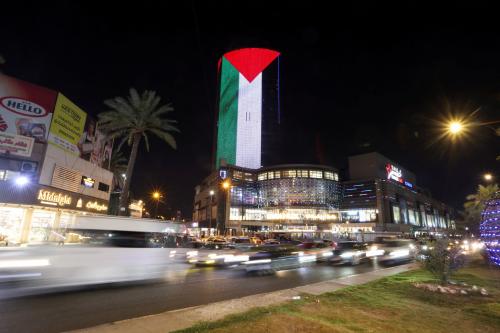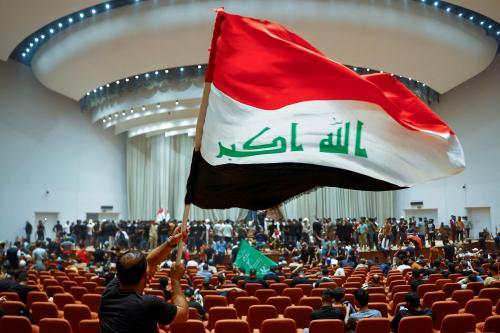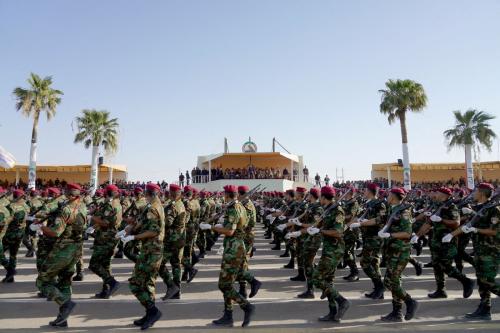This piece is part of a series titled “Nonstate armed actors and illicit economies in 2024” from Brookings’s Initiative on Nonstate Armed Actors.
The Popular Mobilization Force (PMF) is on its way to becoming Iraq’s preeminent political and institutional power, with its economic power also expanding. The umbrella militia organization, which is led by Iran-aligned factions, has markedly enhanced its influence over the Iraqi state and government over the past two years.
The PMF, with backing and support from Iran, hopes to drive the United States out of Iraq as the war in the Gaza Strip unfolds. Since regional tensions heightened after October 7, Iran-backed militias have attacked U.S. forces in Iraq and Syria at least 160 times, including an attack in Jordan by Kataib Hezbollah, a predominant group within the PMF (and its sister group, the Islamic Resistance in Iraq) that killed three Americans. The U.S. Embassy in Baghdad and a base in Erbil have been targeted repeatedly, as has the Kurdistan region.
Over the past two years, the PMF has expanded its influence domestically. However, the group could decidedly instrumentalize the war in Gaza in 2024, raising the prospect of further attacks on U.S. forces and the Kurdistan region, both of which impose limits on the PMF’s influence and are essential to the campaign to counter the Islamic State (ISIS). To protect U.S. interests, contain Iran’s influence, and prevent an ISIS resurgence, Washington must keep its troops in Iraq and consider decisive military measures that address and preempt the escalatory attacks by the PMF and its backers in Iran.
Growing political and institutional power
The PMF was formed in 2014 after ISIS seized Mosul and Grand Ayatollah Ali al-Sistani issued a fatwa that called for Iraqis to fight to defend their country. Sistani subsequently denounced the PMF for exploiting his religious decree to swell its ranks, since Sistani had in fact asked Iraqis to join Iraq’s armed forces. In 2014, the PMF was a rag-tag army of militias; four years later, it was integrated into the state as an auxiliary to the armed forces, which secured its fighters salaries and benefits equal to those of regular military personnel.
In 2018, the PMF contested Iraq’s parliamentary elections as a single bloc, emerging second on its electoral debut. This impressive showing was attributed to low voter turnout and electoral apathy in the wake of the uprising against the Baghdad government, led by the Tishreen movement, which also protested the PMF and Iran. In response, the PMF unleashed its militias and brutally repressed protestors.
Moreover, in March 2020, factions aligned with Sistani withdrew from the PMF because of its ties to Iran. This split was a symbolic blow to the PMF, which had drawn religious legitimacy from Sistani’s fatwa. Iran-aligned groups also have fierce internal rivalries. As recently as August 2022, clashes between Muqtada al-Sadr’s supporters and the PMF pushed Iraq to the brink of civil war. Collectively, these factors, in addition to the U.S. assassination of PMF founder Abu Mahdi al-Muhandis in 2020, indicated that the PMF would struggle to maintain its ascension.
However, the PMF’s victory in Iraq’s December 2023 provincial elections highlights its remarkable resiliency. The PMF secured 101 out of 285 provincial council seats, with several implications for Iraq. The provincial elections’ outcome is important for Iraq’s upcoming parliamentary elections, as it empowers incumbents to wield patronage and influence over the electoral landscape. The most dominant political actors in the provincial councils have an extensive mandate and resources, including control over budgets, the employment of civil servants, contracts, and local security.
Beyond its formidable presence in the Iraqi parliament, the PMF indirectly controls several ministries and the Supreme Court. The Supreme Court has exercised its influence over the country’s elections, government-formation rules, and Kurdish oil exports to suppress the PMF’s political rivals. Within the security forces, the Badr Brigade controls the Interior Ministry, and the PMF has a symbiotic relationship with some parts of the Iraqi security forces, including the military, where PMF officials have outsized authority.
Expanding economic power
The PMF’s electoral victory and dominance have significant strategic implications. The PMF’s status as a hybrid paramilitary group—with one foot inside and another outside the state—has been normalized. This makes it unlikely that the PMF will ever consent to integration with the armed forces or civilian oversight. The PMF can continue to claim all the benefits of being a formal member of the armed forces without submitting to the state. This includes access to the state budget, constitutional legitimacy, and legal protections that limit its exposure to punitive measures, such as sanctions and proscription designations.
As a hybrid actor, the PMF can direct the state and its resources to challenge its rivals. Domestically, the PMF’s normalization allows it to maintain and expand its state capture, while empowering its ability to brush aside its rivals, such as the Sadrists. This will be particularly important within Iraq’s economic landscape, where the PMF vies with its rivals for state contracts, diverted customs revenues that generate $10 billion annually, control of illegal taxation that yields $300,000 a day, and tens of millions of dollars in the scrap metal trade.
The PMF also oversees a vast property empire and economic network. In November 2022, the PMF formed the Muhandis General Company and was awarded land half the size of Lebanon along the border with Saudi Arabia. It has an initial operating budget of close to $70 million, which complements the $2.6 billion budget it receives from the state, and is modeled on the Islamic Revolutionary Guard Corps’ Khatam al-Anbia, a giant holding firm worth billions of dollars. This has frustrated the PMF’s rivals within the Shiite community who continue to work within the state’s framework and refuse to submit to the PMF’s influence.
In the past, the PMF has attempted to torpedo investment projects the state awarded to foreign companies, as portrayed by its attempts to derail a contract that then-Prime Minister Mustafa al-Kadhimi had awarded to South Korea’s Daewoo in favor of a Chinese company. (In November 2021, the PMF attempted to assassinate Kadhimi but failed.) Now, however, the PMF has the capacity to prevent investment projects that are not conducive to its objectives, which has implications for the billions of dollars Qatar and Saudi Arabia hope to invest in Iraq. This arrangement seriously undermines Iraq’s ability to balance its ties between Iran and the Arab world.
Infiltrating Kurdistan
The PMF is now expanding its influence in Kurdistan. In addition to Kurdistan being a vital U.S. counterterrorism ally, the U.S. base in Erbil serves as a U.S. special operations hub for hundreds of U.S. troops, logistics, and a staging site for operations in Iraq and Syria. Kurdistan is a strategic junction because of its proximity to Western actors and the conflict in Syria, ties to Turkey, and growing relationship with the Gulf Arab states.
Iran and the PMF are determined to expel U.S. forces from both Kurdistan and Iraq overall, as the U.S. presence imposes limits on their influence. Most recently, Iran went as far as launching a ballistic missile attack on Erbil on January 15, 2024, which purportedly targeted an Israeli base—the government in Baghdad dismissed this allegation, and it has proved to be a baseless justification for an attack that killed a prominent businessman and his 11-month-old daughter.
The PMF’s control over the judiciary helped cement rulings that have determined independent Kurdish oil exports through Turkey to be illegal. Kurdish oil exports have stopped as a result, crippling Kurdistan’s economy. This aims to force the Kurdistan region to pivot toward Tehran, enabling the Iranian regime to expand its influence into the only part of Iraq that remains outside its orbit.
Implications for U.S. policy
The Biden administration may be averse to a more aggressive military campaign against Iran and the PMF, despite that it is necessary to deter their attacks on the United States and its allies. Yet there are other measures that Washington can undertake. These include deploying Patriot systems to Kurdistan that can destroy incoming missiles, which will have a material impact by protecting the last remaining bastion of U.S. influence in Iraq. Such a move would constitute a show of desperately needed strength and leadership from the Biden administration.
The Biden administration may be contemplating the withdrawal of U.S. forces in Iraq, but this would be disastrous for the anti-ISIS campaign. ISIS has been degraded in Iraq, but the terrorist group retains the capacity and infrastructure to mount a comeback, as it did in 2014, three years after the Obama administration withdrew U.S. forces from Iraq. The United States could consider withdrawing its forces from Arab Iraq, accepting that the political order in Baghdad and the PMF’s predominance makes its presence unsustainable—but only if this is part of a withdrawal to Erbil, where Washington can continue its counterterrorism campaign.
The PMF and Iran should not have it both ways, where the United States withdraws its forces and paves the way for Iran’s expansion into Kurdistan. Likewise, Prime Minister Mohammed Shia al-Sudani should not make concessions to Iran that would see his government, and Iraq, capitulate to Tehran and its proxies. By withdrawing U.S. forces to Erbil, the United States is building on an ally’s capabilities and a safe haven that has protected the groups and officials who have fallen prey to the PMF’s terror campaign. Preventing Iran’s expansion into Kurdistan empowers moderate Iraqi actors in Baghdad that want to maintain balanced ties to the West and the region at large, rather than see Iraq become an Iranian client state.




Commentary
The Popular Mobilization Force is turning Iraq into an Iranian client state
February 2, 2024